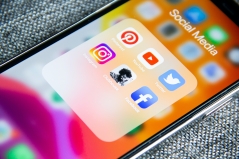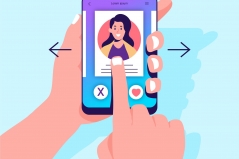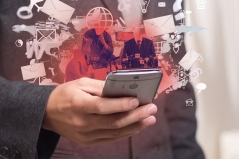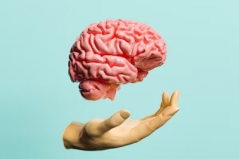Diagnosed by AI – What our social media behavior reveals about our mental health

keywords:
mental health / social media / artificial intelligence / eating disorder / depression
Diagnosed by AI – What our social media behavior reveals about our mental health
When mental illnesses are detected early and treated promptly, people affected tend to suffer less and have a better chance of recovery. Until now, identifying signs of mental illness in everyday life has required human expertise. Researchers are developing new approaches to automatically detect mental illness by using information from social media. But how well does this work, and what risks might this approach involve? / more
The unbearable heaviness of having an appearance: How society teaches us to judge our bodies

keywords:
body image / sociocultural influences / aesthetic surgery / social media / social media literacy
The unbearable heaviness of having an appearance: How society teaches us to judge our bodies
Why do so many of us, especially women, struggle to feel comfortable in our own bodies? This article explores how sociocultural pressures and social media shape body dissatisfaction and drive interest in cosmetic surgery. It also offers evidence-based strategies to build a healthier, more compassionate relationship with your body. / more
Self-care in the digital age: How we can handle social media in a healthy way

keywords:
social media / mental health / excessive use / self-care / prevention
Self-care in the digital age: How we can handle social media in a healthy way
Do you find it difficult to reduce the time you spend on social media in the long term? Are you interested in learning why you often use social media excessively and what negative effects this can have on you? Here, you'll not only find answers but also practical strategies to protect your mental health, helping you achieve a balanced approach to social media use. / more
Internet, dating, addiction: A match made in heaven

keywords:
online dating / internet addiction / social media / smartphone addiction / problematic internet use
Internet, dating, addiction: A match made in heaven
Dating apps are said to have turned dating into an addiction. Instead of efficiently connecting people for in-person dates, users may get lost in “binge swiping”. But what makes it so hard to stop swiping – and when does it become a problem? We review existing research and explain what researchers mean by “online dating addiction”, why the science isn’t so simple, and what you can do to resist the pull. / more
Digital moral distortion: How social media can negatively shape our judgement of right and wrong

keywords:
morality / social media / moral judgement / moral outrage / misinformation
Digital moral distortion: How social media can negatively shape our judgement of right and wrong
Social media is far more than a tool for communication, it is a digital social environment at scale. Unlike any other space before it, social media platforms expose us to the judgements of others. From expressions of admiration to condemnation, we are immersed in the opinions of others with unprecedented frequency. In this article, we explore how such online environments hold the potential to distort our perception of societal consensus on core moral issues and influence our understanding of what is considered right and wrong in society. / more
Covert control: How political elites and influencers use manipulation on social media

keywords:
political influencers / manipulation / misinformation / social media / media literacy
Covert control: How political elites and influencers use manipulation on social media
The popularity of users like politicians and political influencers on social media demonstrates their power and sway over public discourse today. But how do these political users gain and maintain power? This article explores how the current media landscape is dominated by political influencers and elites, making it harder for users to know what’s trustworthy and detect misinformation. By spotlighting the tactics that some of these sources use to build influence with their audiences, we bring attention to how political information is shared and processed in today’s digital landscape. / more
Social media use towards self-diagnosing and health anxiety

keywords:
self-diagnosis / social media / mediated communication / health anxiety
Social media use towards self-diagnosing and health anxiety
Self-diagnosing occurs when individuals who are not medical professionals intrinsically establish themselves as living with a particular medical diagnosis. Self-diagnosing is becoming all the more prominent due to increasing communication about health, symptoms, and diagnoses online, namely on algorithmically-dominated social media platforms. While this can be an empowering process for individuals suffering from health issues, it can also perpetuate health anxiety. Users should carefully review health information which they consume on social media and online. / more
Viral and harmful: Violence in media and its impact on empathy

keywords:
media violence / empathy / social media / desensitization / adolescents
Viral and harmful: Violence in media and its impact on empathy
From fight videos on TikTok to hate comments on Instagram, violence is omnipresent online, but what does it do to our empathy? Studies reveal that repeated exposure to digital aggression can reduce our ability to feel concern or discomfort when witnessing others' pain, especially in teens. Yet empathy doesn’t have to erode. This article explains how online violence affects our ability to care and offers practical strategies to maintain compassion in virtual spaces and effectively strengthen empathy over the long term. / more
What is manifesting all about? The universe as a difficult conversational partner

keywords:
manifesting / manifestation / affirmations / Universe / law of attraction / social media / goal setting / goal pursuit / planning / self-efficacy
What is manifesting all about? The universe as a difficult conversational partner
It sounds too good to be true: "You can achieve any goal with simple affirmations". This is exactly how people on social media try to make their wishes come true by "manifesting". Speak a wish into the Universe and it will come true, it will manifest, it will become reality—it sounds simple and would be pretty awesome if it works. / more
The Dark Side of Social Media - Unpacking Its Psychological Impact

keywords:
Special Issue / social media
The Dark Side of Social Media - Unpacking Its Psychological Impact
Social media has revolutionized the way we connect, communicate, and consume information. However, its darker aspects pose significant challenges to individuals and societies. This Special Issue (SI) seeks to explore the negative psychological consequences of social media, such as their impact on interpersonal communication, the formation of political beliefs, mental health and body image, consumer behavior, and information processing. We invite research that... / more
